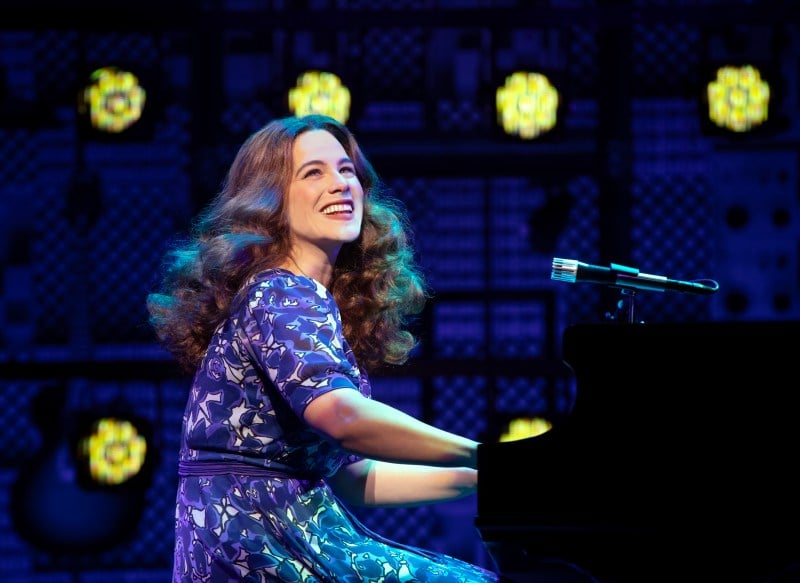“Beautiful– The Carole King Musical” has joyously returned to the SHN Golden Gate Theatre for a limited two week engagement. Its stellar touring cast effectively propagates a unique dialogue with San Franciscan audiences and emphasizes “Beautiful’s” tonal complexity and engaging narrative.
The Tony and Grammy-winning musical centers on the life and career of singer/songwriter Carole King as she evolves from a 16-year-old pavement pounder to a Carnegie Hall headliner. A large majority of the story interrogates the turmoil in King’s personal life. This focus ultimately deepens the impact of King’s personal growth and professional metamorphosis. The musical is defined by toe-tapping hits including, “I Feel The Earth Move,” “A Natural Woman” and “So Far Away,” which the piano conductor and most audience members boogie to throughout the production. It’s nearly impossible not to.
Most of the show’s book and structure is successful due to the individual performances of many key cast members. A clear standout is Sarah Bockel, who plays Carole King herself. Bockel embodies the role with natural nuance and warmth. She impressively evolves both emotionally and vocally throughout the show and handles both comedic and dramatic acting beats with grace and honesty. An additional standout actor is Jacob Heimer, who portrays Barry Mann, one of King’s friendly songwriting rivals. Heimer often provides lovable comedic relief, offsetting Dylan Wallach’s unlikeable Gerry, and he especially stuns with a forceful rendition of “We Gotta Get Out of This Place” in the second act.
Since many audience members remember King’s initial rise to fame first hand, the theater transforms into a space of cultural celebration and experience sharing. Beginning with Carole King’s opening monologue, King seems to subliminally invite observers to relive their own memories as the show unfolds. And boy, does it work. When I attended the performance, many enjoyed basking in nostalgia while collectively riding the tide of second-wave feminism “Beautiful”’s narrative centralizes. Never have I heard so much vocal participation from an audience predominantly comprised of middle-aged or elderly folks, who cheered for King when she decided to sing her own songs or verbally balked at her husband’s infidelity.
At times, the musical’s scenes become a bit tiresome. This is partially due to some drag in line delivery, but mostly because many scenes are similarly set in King’s office or focused on her difficulties while songwriting. But any problems that may result from this structure are resolved through the implementation of performance breaks, or moments in which the audience is briefly pulled out of the narrative to fully appreciate a famous song as a stand-alone piece of art. In these moments, I can imagine many audience members layer their own experiences onto the songs and reflect on their own memories that may be connected to the music, particularly because these moments are only loosely connected to “Beautiful”‘s primary narrative. Though songs are usually most successful when serving as plot-furthering devices, jukebox musicals have the unique opportunity to lean into productively non-narrative musical moments. This production should serve as the gold standard.
Some excellent musical breaks include “Some Kind of Wonderful” and “On Broadway” sung by performers portraying The Drifters, “Will You Love Me Tomorrow” sung by performers portraying The Shirelles, and “The Locomotion” featuring a performer portraying Little Eva. During these songs, various highlighted ensemble members sing with precision and exuberance in reverence to each of the respective songwriters. Each ensemble soloist belts absurdly high and harnesses massive vocal control while mimicking the sounds of other famous musicians. I also appreciate how the casting team chose actors with differing body types to fill the ensemble and cast as a whole, displaying a refreshingly natural representation of body image onstage.
Another aspect of the production that successfully capitalizes on the audience’s pre-established knowledge of King’s era is its comedy. In a few show-stealing moments, The Drifters and other periphery cameo characters exaggerate classic music styles and dances in a way that subtly wink at the audience. Though these performance moments likely wouldn’t have been viewed as comedic in the 50’s or 60’s, the suggestive flick of a hand or oh-so-precise sidestep expertly conveys feelings of solidarity with audiences and acknowledges the goofiness of some outdated performance moments when placed in a contemporary context. The show also interestingly enhances its comedic components through uses of dramatic irony. Many times King’s mother, her producer or King herself easily win laughs after conveying lack of faith in tunes that the audience knows become hits, and the delivery of these moments is superb and wholly satisfying.
Outside of instances in which the narrative uses the audience’s basic understanding of King’s career to enhance storytelling elements, the show is also largely informative. The show’s illumination of specific well known songs tactfully educate audiences who may not have been aware of King’s involvement in so many musical hits before her rise as an independent music personality. Coming away from the show with these discoveries is perhaps one of the most resonant aspects of this performance experience.
Overall, I am happily surprised by “Beautiful”’s depth. The show superbly honors King, is shockingly hilarious and effectively leans into darker subject matter. The main actors hone the historical figures they’re playing and encourage audiences to join their feminist leanings. I left the theater humming King’s iconic tunes feeling happy, proud and moved. You will too.
“Beautiful– The Carole King Musical” runs through June 9 at the SHN Golden Gate Theatre. Tickets can be purchased at shnsf.com.
Contact Chloe Wintersteen at chloe20 ‘at’ stanford.edu.
